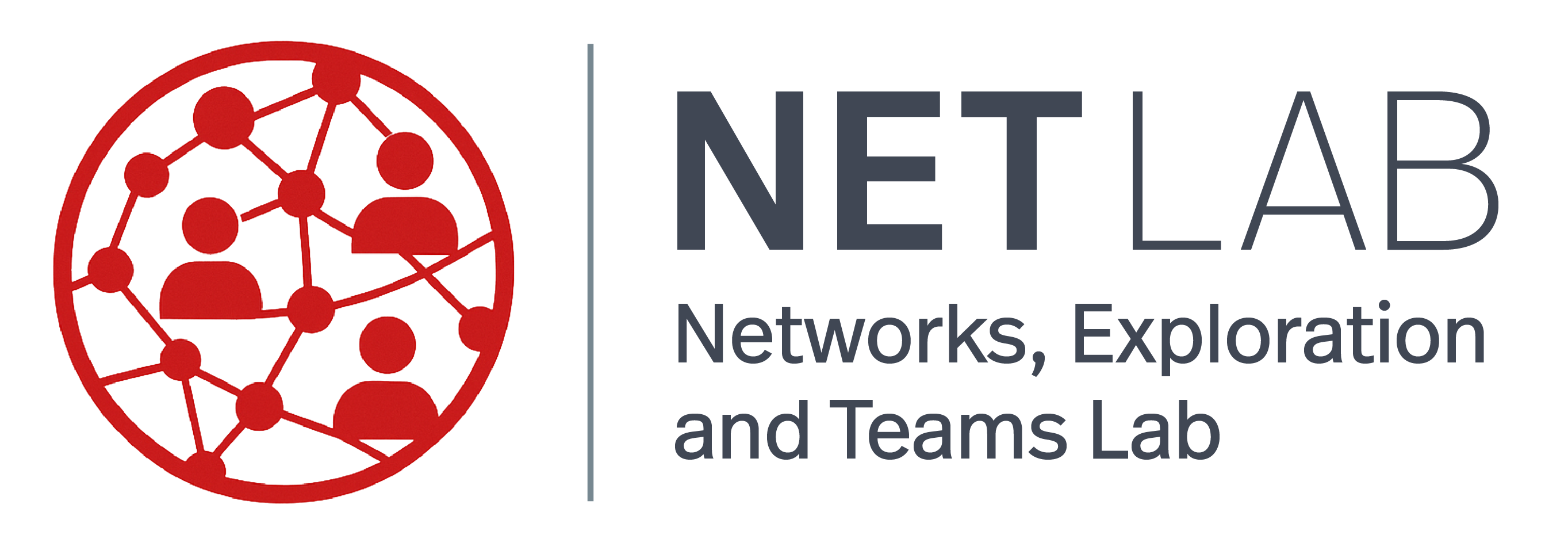Our research explores how cross-boundary collaboration—spanning knowledge, gender, culture, and career stage—drives the formation and innovation of scientific teams. Using large-scale datasets and advanced network science methods, we analyze collaboration in emerging fields and ecosystems. We also develop novel tools, such as hypergraph measures and semantic knowledge diversity metrics, to reveal how teams organize and evolve over time.
- Modi, N., Lungeanu, A., DeChurch, L.A., & Contractor, N.S. (2025). The differential impacts of team diversity as variability versus atypicality on team effectiveness. Nature: Scientific Reports, 15(1), 4461
- Lungeanu, A., Whalen, R., Wu, Y., DeChurch, L.A., & Contractor, N.S. (2023). Diversity, networks, and innovation: A text analytic approach to measuring expertise diversity. Network Science, 11(1), 36-64.
- This work is funded by the National Science Foundation (Award number: 1856090) and National Institute of General Medical Sciences (Award number: 1R01GM137410).
University research centers and institutes play a pivotal role in advancing interdisciplinary collaboration and knowledge production. These entities are often designed to break down disciplinary boundaries and promote innovation. However, their long-term impact on researcher networks, institutional structures, and scientific outcomes remains insufficiently understood. This research addresses a critical gap by systematically analyzing how centers influence collaboration across U.S. research universities, identifying the structural and organizational factors that predict their success.
- This work is funded by a Tier 1 Award from the Office of the Provost, the College of Arts, Media and Design, the D'Amore-McKim School of Business, and the College of Science at Northeastern University.
Our research investigates the performance of “extreme” teams—such as those involved in space missions. Funded by NASA, this work focuses on how team composition, leadership structures, and social dynamics affect performance under extreme conditions. Using computational models and data from NASA analog missions, we study shared leadership’s role in developing shared mental models, the evolving nature of interpersonal relationships in confined environments, and how work design and situational factors influence team engagement and the flow of information in multiteam systems. These insights inform the design of future long-duration space exploration teams and improve our understanding of team effectiveness in extreme settings.
- Lungeanu, A., Carter, D., Pearman, J., DeChurch, L., Contractor, N. (2025). Communication Delays and Virtual Team Performance: Collective Attention as a Key Mechanism and Intervention Opportunity. Paper presented at the 75th Annual Conference of the International Communication Association (ICA), Denver, CO.
- DeChurch, L., Lungeanu, A., Chan, M., Contractor, N. (2024). Leading the Crew to Mars: Evidence from NASA HERA Analog Crews. IAC 2024 Congress Proceedings 75th International Astronautical Congress (IAC), Milan, Italy.
As NASA sets its sights on more Earth-independent missions, the mission to Mars as a prime example, a team’s composition becomes a critical issue for mitigating the risks of such endeavors. The purpose of this project is to develop and validate TEAMSTaR (Tool for Evaluating And Mitigating Space Team Risks), a team composition decision support system that can be used by mission stakeholders (e.g., mission schedulers, crew members) to predict how a hypothetical team’s social relationships are likely to evolve and influence crew performance over the course of a mission. TEAMSTaR will enable decision makers to evaluate team composition scenarios across full teams, single-member replacements, and team subsets.
- Contractor, N.S., Chan, M., Lungeanu, A., DeChurch, L. A., Begerowski, S., & Bell, S. (2025). TEAMSTaR: Supporting Resilient Teams to Go the Distance. Paper presented at the NASA Human Research Program Investigators' Workshop, Galveston, TX.
- This work is funded by the National Aeronautics and Space Administration (Award number: 80NSSC21K0925).

